have_用法小结
- 格式:doc
- 大小:46.00 KB
- 文档页数:15
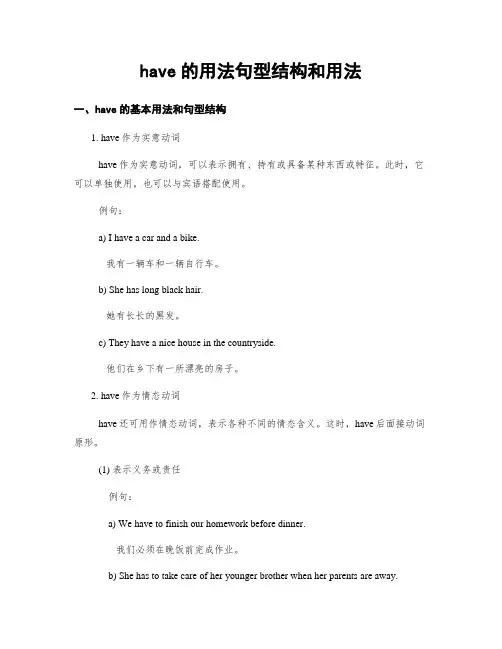
have的用法句型结构和用法一、have的基本用法和句型结构1. have作为实意动词have作为实意动词,可以表示拥有、持有或具备某种东西或特征。
此时,它可以单独使用,也可以与宾语搭配使用。
例句:a) I have a car and a bike.我有一辆车和一辆自行车。
b) She has long black hair.她有长长的黑发。
c) They have a nice house in the countryside.他们在乡下有一所漂亮的房子。
2. have作为情态动词have还可用作情态动词,表示各种不同的情态含义。
这时,have后面接动词原形。
(1) 表示义务或责任例句:a) We have to finish our homework before dinner.我们必须在晚饭前完成作业。
b) She has to take care of her younger brother when her parents are away.父母不在家时,她得照顾弟弟。
(2) 表示允许或许可例句:a) You can have some cake if you want.如果你想要的话,你可以吃点蛋糕。
b) Students are not allowed to use mobile phones during class.学生上课期间不允许使用手机。
(3) 表示可能性或推测例句:a) It may have rained last night, the ground is wet.昨晚可能下过雨,地面都湿了。
b) She might have missed the bus. She's not here yet.她可能错过了公交车。
她还没到。
二、have的常见短语用法1. have a good/bad time意思是度过愉快/糟糕的时光。
例句:We had a good time at the party last night.昨晚在派对上我们玩得很开心。
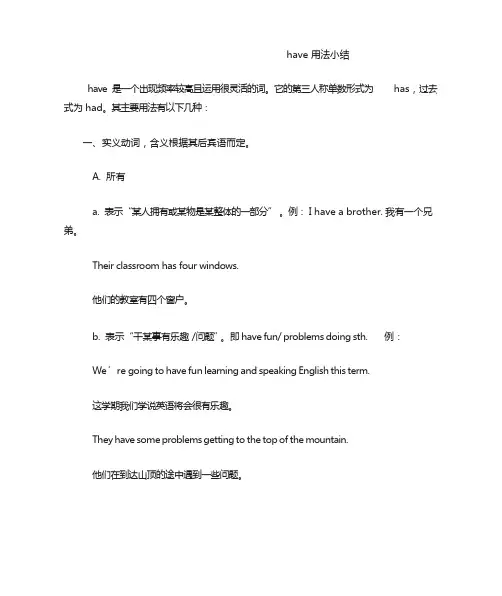
have 用法小结have 是一个出现频率较高且运用很灵活的词。
它的第三人称单数形式为has,过去式为 had。
其主要用法有以下几种:一、实义动词,含义根据其后宾语而定。
A.所有a.表示“某人拥有或某物是某整体的一部分” 。
例: I have a brother. 我有一个兄弟。
Their classroom has four windows.他们的教室有四个窗户。
b.表示“干某事有乐趣 /问题”。
即 have fun/ problems doing sth. 例:We ’re going to have fun learning and speaking English this term.这学期我们学说英语将会很有乐趣。
They have some problems getting to the top of the mountain.他们在到达山顶的途中遇到一些问题。
B.“吃、喝”,表示吃三餐。
例:He usually has breakfast at school.他通常在校吃早餐。
C.进行、从事(某事)a.与一名词连用等于与该名词同形的动词的意义。
例:have a r est= rest have a drink= drinkhave a dream= dreamb.与不同名词连用have a class 上课have sports 进行体育活动have a picnic 野餐D.享有、经历、遭受a.Did you have a good time yesterday? (=Did youenjoy yourself yesterday? )昨天你过得愉快吗?b.Have a nice weekend! 祝你周末愉快!c.I have a h e a d a ch e. (=My headhurts. =I have a paininmy he ad.)我头痛。
二、情态动词 have to ,表示因客观环境促使而不得不做某事。
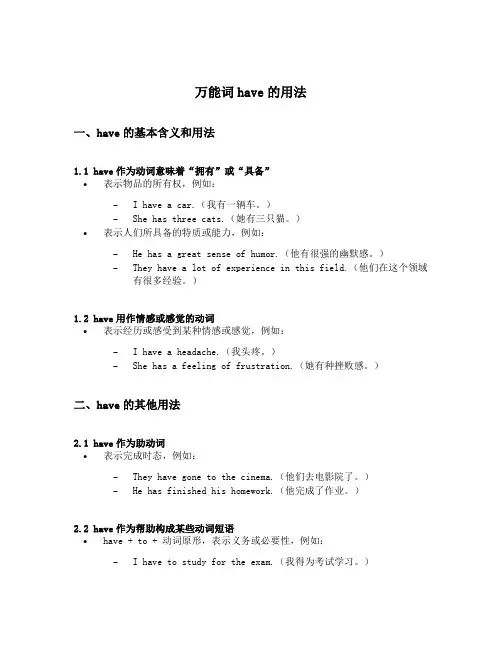
万能词have的用法一、have的基本含义和用法1.1 have作为动词意味着“拥有”或“具备”•表示物品的所有权,例如:–I have a car.(我有一辆车。
)–She has three cats.(她有三只猫。
)•表示人们所具备的特质或能力,例如:–He has a great sense of humor.(他有很强的幽默感。
)–They have a lot of experience in this field.(他们在这个领域有很多经验。
)1.2 have用作情感或感觉的动词•表示经历或感受到某种情感或感觉,例如:–I have a headache.(我头疼。
)–She has a feeling of frustration.(她有种挫败感。
)二、have的其他用法2.1 have作为助动词•表示完成时态,例如:–They have gone to the cinema.(他们去电影院了。
)–He has finished his homework.(他完成了作业。
)2.2 have作为帮助构成某些动词短语•have + to + 动词原形,表示义务或必要性,例如:–I have to study for the exam.(我得为考试学习。
)–She has to finish the report by tomorrow.(她必须在明天之前完成报告。
)•have + 动词的过去分词,表示完成或被动的意义,例如:–We have finished our project.(我们完成了我们的项目。
)–The book has been read by many people.(这本书已经被很多人读过。
)2.3 have用作动词与介词的搭配•have + 宾语 + 介词短语,表示拥有或进行某种行为,例如:–He has a cup of coffee in the morning.(他早上喝一杯咖啡。
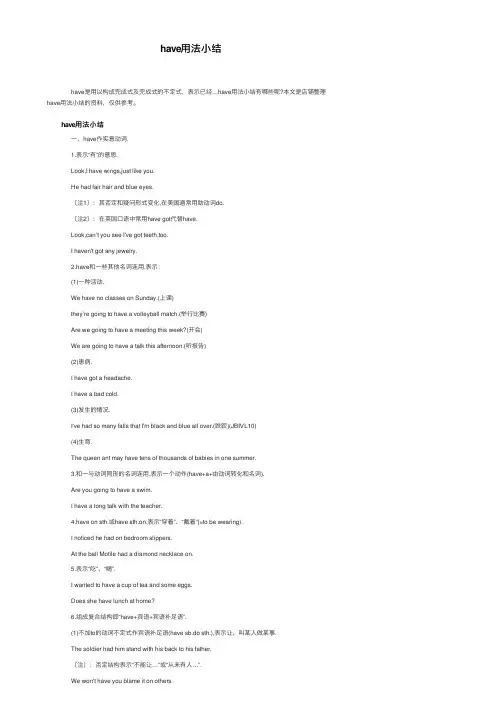
have⽤法⼩结 have是⽤以构成完成式及完成式的不定式,表⽰已经…have⽤法⼩结有哪些呢?本⽂是店铺整理have⽤法⼩结的资料,仅供参考。
have⽤法⼩结 ⼀、have作实意动词. 1.表⽰“有”的意思. Look,I have wings,just like you. He had fair hair and blue eyes. 〔注1〕:其否定和疑问形式变化,在美国通常⽤助动词do. 〔注2〕:在英国⼝语中常⽤have got代替have. Look,can’t you see I've got teeth,too. I haven't got any jewelry. 2.have和⼀些其他名词连⽤,表⽰: (1)⼀种活动. We have no classes on Sunday.(上课) they’re going to have a volleyball match.(举⾏⽐赛) Are we going to have a meeting this week?(开会) We are going to have a talk this afternoon.(听报告) (2)患病. I have got a headache. I have a bad cold. (3)发⽣的情况. I've had so many falls that I'm black and blue all over.(跌跤)(JBⅣL10) (4)⽣育. The queen ant may have tens of thousands of babies in one summer. 3.和⼀与动词同形的名词连⽤,表⽰⼀个动作(have+a+由动词转化和名词). Are you going to have a swim. I have a long talk with the teacher. 4.have on sth.或have sth.on,表⽰“穿着”、“戴着”(=to be wearing). I noticed he had on bedroom slippers. At the ball Motile had a diamond necklace on. 5.表⽰“吃”、“喝”. I wanted to have a cup of tea and some eggs. Does she have lunch at home? 6.组成复合结构即“have+宾语+宾语补⾜语”. (1)不加to的动词不定式作宾语补⾜语(have sb.do sth.),表⽰让、叫某⼈做某事. The soldier had him stand with his back to his father. 〔注〕:否定结构表⽰“不能让…”或“从未有⼈…”. We won't have you blame it on others. She had never had anybody speak to her that way before. (2)现在分词作宾语补⾜语(have sb.(sth.)doing),表⽰让(使)某⼈做某事. …the two men had their lights burning all night long…. (3)过去分词作宾语补⾜语(have sb.(sth.)done),表⽰: ①使(让,请)别⼈作某事,表⽰的动作是别⼈做的. Emperor Qin Shi Huang had all the walls joined up. …he should have new clothes made of this splendid cloth for the coming great procession. ②遭遇到某事. Houses near airports sometimes have their windows broken. Workers in some industries have their hearing harmed by the noise of the machine. ⼆、have与to⼀起构成情态动词,表⽰“不得不”、“必 须”,可⽤于各种时态. I have to look after her at home. 三、have做助动词与动词的过去分词⼀起构成现在完成时 和过去完成时. Great changes have taken place the last two years. They said that the Arab had stolen their camel. 四、have⽤于“情态动词+have+过去分词”的结构,有推测、假设之意. 1.must+have+过去分词,表⽰对过去时间发⽣的动作或存在的情况的推测,⼀般⽤于肯定句. Her father thought that she must have met a fairy. You must have left your bag in the theatre. 2.can(could)+have+过去分词,表⽰对过去发⽣事情的“不肯定”,常⽤于否定句和疑问句. He can't have been to your home,he doesn't know your address. 3.should+have+过去分词,表⽰“某事本该早做⽽实际未做”,⽤于肯定句. You should have been here five minutes ago. 五、have⽤于某些成语,表⽰固定的意思. 1.have a word(a few words)with sb.,表⽰和某⼈说⼀(⼏)句话. Where's Peter?I want to have a word with him. 2.had better+不带to的动词不定式,表⽰“…最好…”. I'd better go and look for him now. 3.have nothing(something)to do with,表⽰“和…⽆(有)”关系. Most of questions had nothing to do with Edison's lessons. 动词have的⽤法 动词have在中学英语中的⽤法 ⼀、have作实意动词。
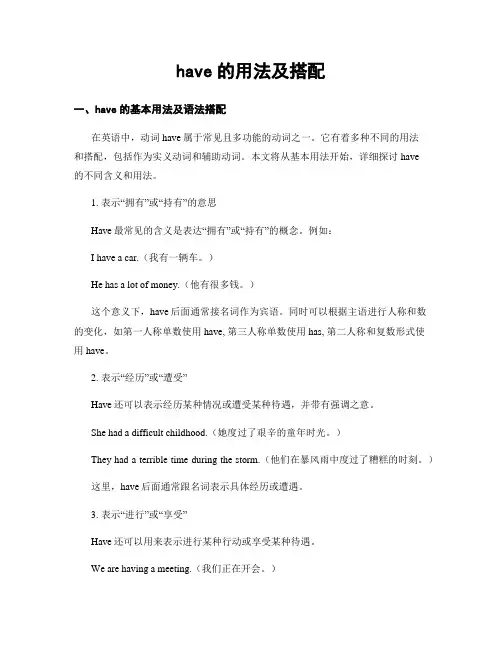
have的用法及搭配一、have的基本用法及语法搭配在英语中,动词have属于常见且多功能的动词之一。
它有着多种不同的用法和搭配,包括作为实义动词和辅助动词。
本文将从基本用法开始,详细探讨have的不同含义和用法。
1. 表示“拥有”或“持有”的意思Have最常见的含义是表达“拥有”或“持有”的概念。
例如:I have a car.(我有一辆车。
)He has a lot of money.(他有很多钱。
)这个意义下,have后面通常接名词作为宾语。
同时可以根据主语进行人称和数的变化,如第一人称单数使用have, 第三人称单数使用has, 第二人称和复数形式使用have。
2. 表示“经历”或“遭受”Have还可以表示经历某种情况或遭受某种待遇,并带有强调之意。
She had a difficult childhood.(她度过了艰辛的童年时光。
)They had a terrible time during the storm.(他们在暴风雨中度过了糟糕的时刻。
)这里,have后面通常跟名词表示具体经历或遭遇。
3. 表示“进行”或“享受”Have还可以用来表示进行某种行动或享受某种待遇。
We are having a meeting.(我们正在开会。
)I had a great time at the party.(我在派对上度过了愉快的时光。
)此时,have后面通常跟动词的现在分词形式作宾语。
4. 表示“发生”或“出现”Have也可以用来描述事件、情况或感觉的发生或出现。
I had a strange dream last night.(昨晚我做了一个奇怪的梦。
)She had a sudden memory of the accident.(她突然回想起那次事故。
)这种情况下,have后面通常用名词表示具体事件、情况或感觉。
5. 表示时间和日期Have在口语中还可用来指定具体时间和日期。
We're having dinner at 7 o'clock tonight.(今晚七点我们要吃晚饭。
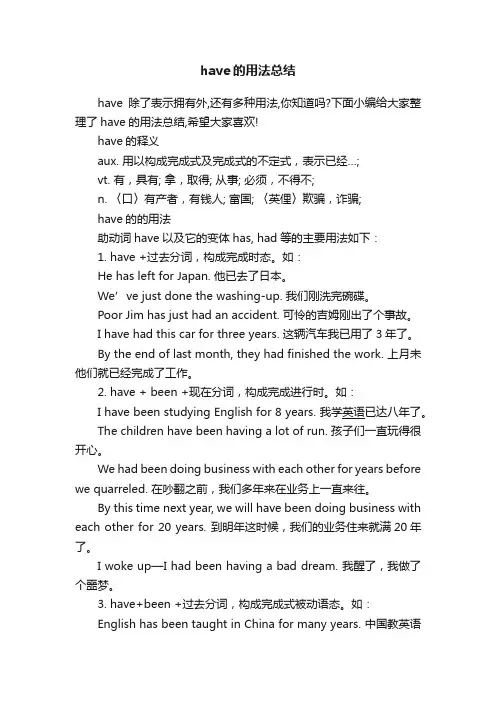
have的用法总结have除了表示拥有外,还有多种用法,你知道吗?下面小编给大家整理了have的用法总结,希望大家喜欢!have的释义aux. 用以构成完成式及完成式的不定式,表示已经…;vt. 有,具有; 拿,取得; 从事; 必须,不得不;n. 〈口〉有产者,有钱人; 富国; 〈英俚〉欺骗,诈骗;have的的用法助动词have以及它的变体has, had等的主要用法如下:1. have +过去分词,构成完成时态。
如:He has left for Japan. 他已去了日本。
We’ve just done the washing-up. 我们刚洗完碗碟。
Poor Jim has just had an accident. 可怜的吉姆刚出了个事故。
I have had this car for three years. 这辆汽车我已用了3年了。
By the end of last month, they had finished the work. 上月未他们就已经完成了工作。
2. have + been +现在分词,构成完成进行时。
如:I have been studying English for 8 years. 我学英语已达八年了。
The children have been having a lot of run. 孩子们一直玩得很开心。
We had been doing business with each other for years before we quarreled. 在吵翻之前,我们多年来在业务上一直来往。
By this time next year, we will have been doing business with each other for 20 years. 到明年这时候,我们的业务住来就满20年了。
I woke up—I had been having a bad dream. 我醒了,我做了个噩梦。
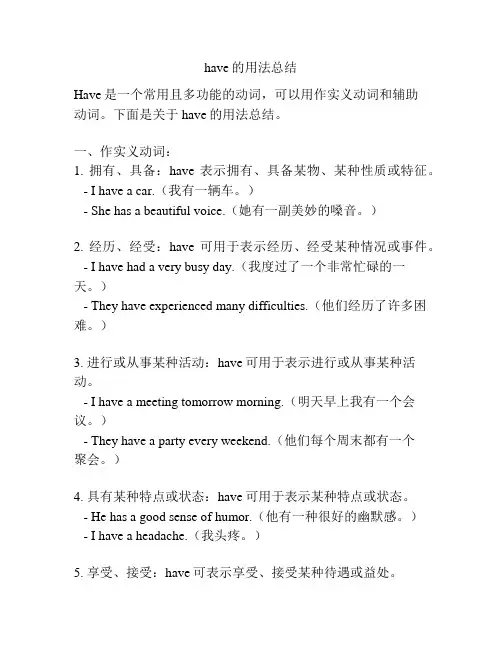
have的用法总结Have是一个常用且多功能的动词,可以用作实义动词和辅助动词。
下面是关于have的用法总结。
一、作实义动词:1. 拥有、具备:have表示拥有、具备某物、某种性质或特征。
- I have a car.(我有一辆车。
)- She has a beautiful voice.(她有一副美妙的嗓音。
)2. 经历、经受:have可用于表示经历、经受某种情况或事件。
- I have had a very busy day.(我度过了一个非常忙碌的一天。
)- They have experienced many difficulties.(他们经历了许多困难。
)3. 进行或从事某种活动:have可用于表示进行或从事某种活动。
- I have a meeting tomorrow morning.(明天早上我有一个会议。
)- They have a party every weekend.(他们每个周末都有一个聚会。
)4. 具有某种特点或状态:have可用于表示某种特点或状态。
- He has a good sense of humor.(他有一种很好的幽默感。
)- I have a headache.(我头疼。
)5. 享受、接受:have可表示享受、接受某种待遇或益处。
- We had a great time on vacation.(我们度过了一个愉快的假期。
)- She had a wonderful opportunity to study abroad.(她有一个很好的机会去国外学习。
)6. 带有消极意义的经验或感触:have可用于表达带有消极意义的经验或感触。
- He had a bad accident last year.(他去年发生了一起严重的事故。
)- She had a terrible nightmare.(她做了一个可怕的噩梦。
)7. 承担责任或义务:have可用于表示承担责任或义务。
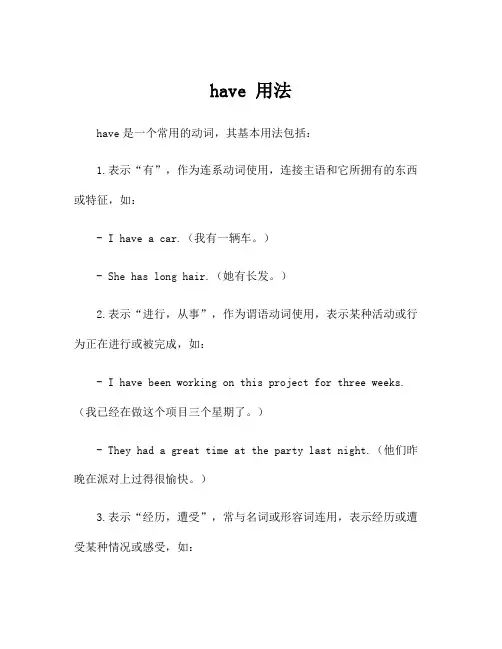
have 用法have是一个常用的动词,其基本用法包括:1.表示“有”,作为连系动词使用,连接主语和它所拥有的东西或特征,如:- I have a car.(我有一辆车。
)- She has long hair.(她有长发。
)2.表示“进行,从事”,作为谓语动词使用,表示某种活动或行为正在进行或被完成,如:- I have been working on this project for three weeks.(我已经在做这个项目三个星期了。
)- They had a great time at the party last night.(他们昨晚在派对上过得很愉快。
)3.表示“经历,遭受”,常与名词或形容词连用,表示经历或遭受某种情况或感受,如:- She has had a difficult year.(她度过了一个艰难的一年。
)- He had a terrible headache yesterday.(昨天他头疼得厉害。
)除了以上基本用法外,have还有很多其他用法和搭配,如:- have to:表示“必须,不得不”,作为情态动词使用,后接动词原形,如:I have to go to work.(我得去上班。
)- have got:表示“有”,口语中常用的一种表达方式,与have同义,如:She's got a new job.(她有了一份新工作。
)- have for breakfast/lunch/dinner:表示“吃什么早餐/午餐/晚餐”,如:What did you have for breakfast this morning?(今天早上你吃了什么早餐?)总之,have是一个多功能的动词,需要根据不同的语境和搭配进行理解和使用。
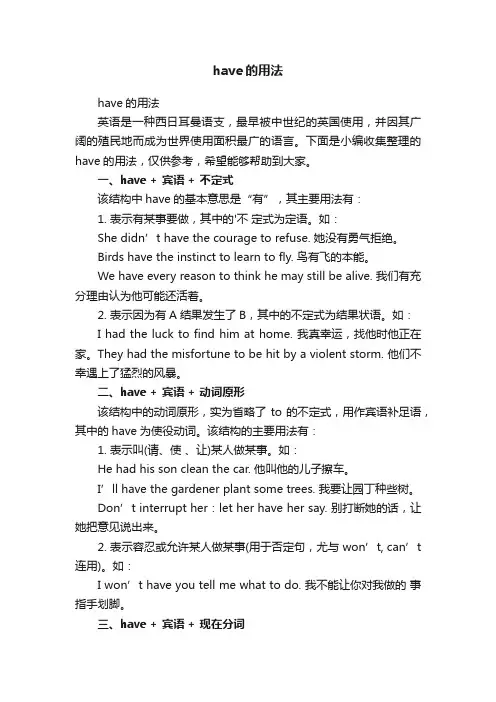
have的用法have的用法英语是一种西日耳曼语支,最早被中世纪的英国使用,并因其广阔的殖民地而成为世界使用面积最广的语言。
下面是小编收集整理的have的用法,仅供参考,希望能够帮助到大家。
一、have + 宾语 + 不定式该结构中have的基本意思是“有”,其主要用法有:1. 表示有某事要做,其中的'不定式为定语。
如:She didn’t have the courage to refuse. 她没有勇气拒绝。
Birds have the instinct to learn to fly. 鸟有飞的本能。
We have every reason to think he may still be alive. 我们有充分理由认为他可能还活着。
2. 表示因为有A结果发生了B,其中的不定式为结果状语。
如:I had the luck to find him at home. 我真幸运,找他时他正在家。
They had the misfortune to be hit by a violent storm. 他们不幸遇上了猛烈的风暴。
二、have + 宾语 + 动词原形该结构中的动词原形,实为省略了to的不定式,用作宾语补足语,其中的have为使役动词。
该结构的主要用法有:1. 表示叫(请、使、让)某人做某事。
如:He had his son clean the car. 他叫他的儿子擦车。
I’ll have the gardener plant some trees. 我要让园丁种些树。
Don’t inte rrupt her:let her have her say. 别打断她的话,让她把意见说出来。
2. 表示容忍或允许某人做某事(用于否定句,尤与won’t, can’t 连用)。
如:I won’t have you tell me what to do. 我不能让你对我做的事指手划脚。
三、have + 宾语 + 现在分词该结构中的现在分词用作宾语补足语,其中的have为使役动词。
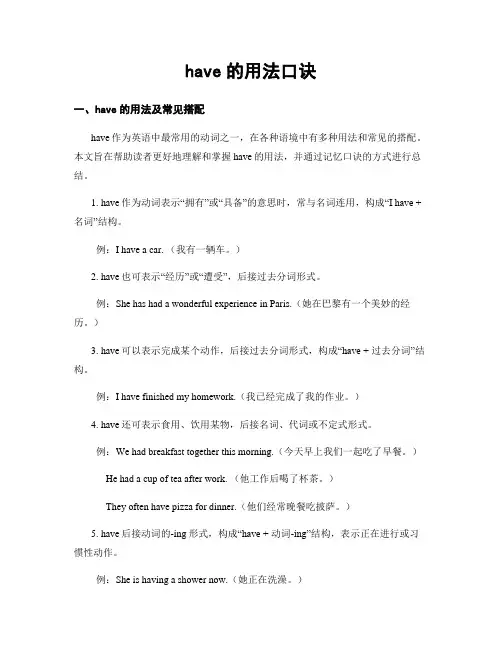
have的用法口诀一、have的用法及常见搭配have作为英语中最常用的动词之一,在各种语境中有多种用法和常见的搭配。
本文旨在帮助读者更好地理解和掌握have的用法,并通过记忆口诀的方式进行总结。
1. have作为动词表示“拥有”或“具备”的意思时,常与名词连用,构成“I have + 名词”结构。
例:I have a car. (我有一辆车。
)2. have也可表示“经历”或“遭受”,后接过去分词形式。
例:She has had a wonderful experience in Paris.(她在巴黎有一个美妙的经历。
)3. have可以表示完成某个动作,后接过去分词形式,构成“have + 过去分词”结构。
例:I have finished my homework.(我已经完成了我的作业。
)4. have还可表示食用、饮用某物,后接名词、代词或不定式形式。
例:We had breakfast together this morning.(今天早上我们一起吃了早餐。
)He had a cup of tea after work. (他工作后喝了杯茶。
)They often have pizza for dinner.(他们经常晚餐吃披萨。
)5. have后接动词的-ing形式,构成“have + 动词-ing”结构,表示正在进行或习惯性动作。
例:She is having a shower now.(她正在洗澡。
)They often have a party on weekends.(他们经常在周末开派对。
)二、口诀总结have的用法为了帮助大家更好地记忆和掌握have的用法,下面给出一个口诀供参考:I have something, that's true,我有东西, 是真实,But sometimes it means I do.但是有时候它意味着我做。
Have can also show possession,"拥有"含有所有权。
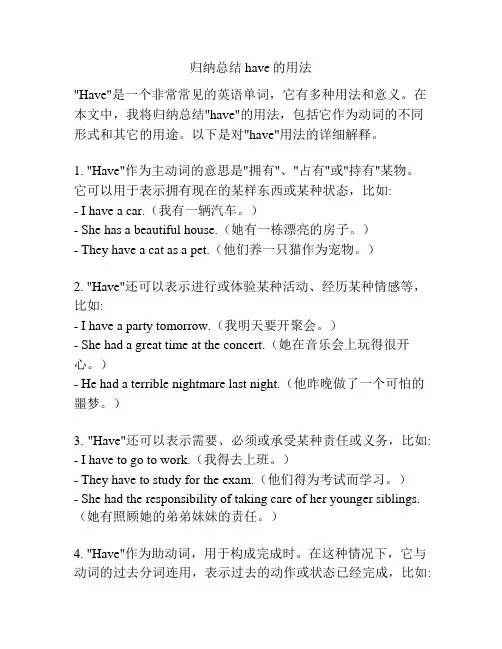
归纳总结have的用法"Have"是一个非常常见的英语单词,它有多种用法和意义。
在本文中,我将归纳总结"have"的用法,包括它作为动词的不同形式和其它的用途。
以下是对"have"用法的详细解释。
1. "Have"作为主动词的意思是"拥有"、"占有"或"持有"某物。
它可以用于表示拥有现在的某样东西或某种状态,比如:- I have a car.(我有一辆汽车。
)- She has a beautiful house.(她有一栋漂亮的房子。
)- They have a cat as a pet.(他们养一只猫作为宠物。
)2. "Have"还可以表示进行或体验某种活动、经历某种情感等,比如:- I have a party tomorrow.(我明天要开聚会。
)- She had a great time at the concert.(她在音乐会上玩得很开心。
)- He had a terrible nightmare last night.(他昨晚做了一个可怕的噩梦。
)3. "Have"还可以表示需要、必须或承受某种责任或义务,比如: - I have to go to work.(我得去上班。
)- They have to study for the exam.(他们得为考试而学习。
)- She had the responsibility of taking care of her younger siblings.(她有照顾她的弟弟妹妹的责任。
)4. "Have"作为助动词,用于构成完成时。
在这种情况下,它与动词的过去分词连用,表示过去的动作或状态已经完成,比如:- I have seen that movie before.(我以前看过那部电影。
动词have的用法规则总结一、have的常见用法及规则1. 表示拥有或具备某种物品或特征- 表示物品的拥有:I have a car.- 表示个人特征:She has blue eyes.2. 表示经历、感受或经受某种情绪- 经历:We had a great time at the party.- 感受:He had a feeling of excitement.- 经受情绪:She had a panic attack.3. 表示进行或完成某项活动、行动或任务- 进行活动:They have lunch together every day.- 完成任务:I have finished my homework.4. 表示发生在过去的事件- 过去事件:They had an argument yesterday.5. 用于构成某些固定表达和习语- Have a good day!- I have my doubts about his story.二、have的时态和形式变化1. 现在时:- 肯定句:I/we/you/they/he/she/it + have + 名词或不定式(原形)- 否定句:I/we/you/they/he/she/it + do not/don't + have + 名词或不定式(原形)- 疑问句:Do + I/we/you/they/he/she/it + have + 名词或不定式(原形)?2. 过去时:- 肯定句:I/we/you/they/he/she/it + had + 名词或不定式(原形)- 否定句:I/we/you/they/he/she/it + did not/didn't + have + 名词或不定式(原形)- 疑问句:Did + I/we/you/they/he/she/it + have + 名词或不定式(原形)?3. 将来时:- 肯定句:I/we/you/they/he/she/it + will/shall/shan't + have + 名词或不定式(原形)- 否定句:I/we/you/they/he/she/it + will not/won't/shan't + have+ 名词或不定式(原形)- 疑问句:Will/Shall + I/we/you/they/he/she/it + have+ 名词或不定式(原形)?4. 完成时:表示过去的已完成动作,并对现在造成影响。
万能词have的用法万能词have的用法Have是英语中非常常见的一个词汇,它有多种不同的用法和意思。
在这里,我们将详细介绍have的各种用法和例句。
一、作为动词1. 表示拥有Have可以表示“拥有”的意思,例如:I have a car.(我有一辆车。
)She has two cats.(她有两只猫。
)2. 表示经历或经受Have也可以表示“经历”或“经受”的意思,例如:I have had a great time on my trip.(我在旅行中度过了美好的时光。
)He has experienced many difficulties in his life.(他在生活中经历了许多困难。
)3. 表示完成某项任务或动作Have还可以表示完成某项任务或动作的意思,例如:I have finished my homework.(我已经完成了我的家庭作业。
)She has cooked dinner for us.(她为我们做了晚餐。
)4. 表示发生或存在Have还可以表示“发生”或“存在”的意思,例如:There has been an accident on the highway.(高速公路上发生了事故。
)She has a lot of friends in this city.(她在这个城市有很多朋友。
)5. 表示情感状态Have还可以表示情感状态,例如:I have a headache today.(我今天头疼。
)She has a happy smile on her face.(她脸上挂着幸福的微笑。
)6. 表示需要或必须Have还可以表示“需要”或“必须”的意思,例如:I have to finish this project by tomorrow.(我必须在明天之前完成这个项目。
)She has to go to the doctor for a check-up.(她需要去医生那里做个体检。
have的用法总结Have的用法总结Have是一个常见的英语单词,用于多种语境中。
在本文中,我们将总结have的不同用法,并提供一些相关例句。
1. 作为动词时,have有以下几种基本用法:a) 表示拥有:Have可以用来表达物品、财产或关系的拥有。
例如:- I have a car.(我有一辆车。
)- She has two cats.(她有两只猫。
)b) 表示经历:Have也可以表示经历或感受到某种事物。
例如:- I have a headache.(我头疼。
)- They had a great time at the party.(他们在派对上玩得很开心。
)c) 表示经营或管理:Have还可以表示经营或管理某个机构、企业或组织等。
例如:- She has her own business.(她有自己的生意。
)- They have a team of talented employees.(他们有一支才华横溢的团队。
)2. Have的其他一些常见用法:a) 作为助动词表示动作或状态的完成:在完美时态中,have 用作助动词来表示过去动作或状态的完成。
例如:- I have finished my homework.(我已经完成作业。
)- They have lived here for five years.(他们在这里住了五年了。
)b) 表示某种行为或习惯:Have有时也用来表示某种行为或习惯。
例如:- She has breakfast every morning.(她每天早上吃早餐。
)- They have a habit of going for a walk after dinner.(他们有晚饭后散步的习惯。
)c) 与名词连用表示某种情感或感受:Have也可以与一些名词连用,表示具体的情感或感受。
例如:- He has a fear of heights.(他害怕高处。
)- She has a strong desire to travel.(她有强烈的旅行欲望。
英语中have用法总结Have作为一个高频动词,它用法多样,既可作为助动词与分词搭配来表示时态,又可作为主动词与名词等搭配来表示拥有或与某些词构成固定搭配。
下面是小编整理的一些关于have用法总结,希望让大家更好地认识have这个单词,提高英语水平。
英语中have用法总结have作为使役动词1.have somebody do something.意为“使某人做.......”例如:Yesterday I had him clean the classroom.2. have somebody/something doing something.意为“使某人/某物处于做.....状态。
”例如:The thief had the light burning all night long.3.have something done.此短语有三层含义:A.使某事被完成。
B.让别人来做此事。
C.遭遇某种不测。
例如:I had this job finished yesterday. My hair is too long;I'll have it cut. He had his leg broken in the accident. 另外2、3两种结构其前与情态动词连用可表示“容忍.....” 例如:I won't have you saying my father like that! I won't have these words said.二.have搭配的短语归纳1.have a rest=have a break2.have a good /hard time3.have a seat/test/try/an accident4.have a word with=have a talk with5.have access to...6.have an advantange over/of7.have fun8.have an effect on9.have an interest in10.have faith in11.have a taste for12.have an ear/eye/attraction for14.have no idea of15.have nothing 0.have a relation to16.have nothing/ something/a lot to do with17. have respect for18. have the right to do something19.have skill in20.have.....in common三.have常考句型1.have a good/hard time ( in) doing something Having been ill in bed for nearly a month,he had a hard time passing the exam.(04福建 )2.have trouble /diffculty in doing something I have no trouble in finding his house.3.have no choice but to do something I have no choice but to stay here.4.have got=have I have got a pen=I have a pen.5.have been to...(曾经到过某地) have gone to...(已经到....去了)I have been to Beijing.6. have a better understanding of...(精通.....) He has a better understanding of English.。
have用法大全归纳"Have" 是一个多功能的英语单词,它可以作为动词、助动词、名词等,有着多种用法。
以下是"have" 的一些常见用法归纳:作为主要动词:1. 拥有或持有:- I have a car.(我有一辆车。
)- She has a beautiful garden.(她有一个美丽的花园。
)2. 经历或经受:- I have had a great experience.(我有过一次很棒的经历。
)3. 享有或经受某种感觉:- We had a wonderful time at the party.(我们在聚会上玩得很开心。
)- She has a headache.(她头疼。
)作为助动词:4. 完成时态:- I have finished my homework.(我已经完成了我的作业。
)5. 进行时态:- They are having dinner.(他们正在吃晚餐。
)6. 情态动词(用于构成疑问句或否定句):- Have you seen this movie before?(你以前看过这部电影吗?)- I haven't been to Paris.(我没去过巴黎。
)作为名词:7. 拥有或财产:- I don't have much money.(我没有太多钱。
)8. 用于餐饮场合,指一道菜:- Let's have dinner together.(我们一起吃晚餐吧。
)9. 作为短语"have to" 表示必须:- I have to finish my work.(我必须完成我的工作。
)表示感觉:10. 表示感觉或状态:- I have a headache.(我头疼。
)- She has a cold.(她感冒了。
)表示关系:11. 表达关系或存在:- I have a friend in New York.(我在纽约有一个朋友。
have的用法及短语一、have的基本用法1. 动词have作为一个常用动词,在英语中具有多种不同的用法。
最基本的意思是“拥有”或“持有”,表示某人或某物具备或占有某种事物。
例如:- I have a car.(我有一辆车)- They have a big house.(他们有一座大房子)- She has a beautiful voice.(她有一副美妙的声音)2. 在现代英语中,have也可以表示经历或发生某个经验、感觉等,类似于汉语中的“遭受”或“经历”。
例如:- I had a great time on vacation.(我度过了一个愉快的假期)- He had an accident last night.(他昨晚出了个事故)- She had a strange dream last night.(她昨晚梦到了一场奇怪的梦)3. 另外,have还可以表示某人已经完成或尽力去完成某个动作。
例如:- I have finished my homework.(我完成了我的作业)- Have you tried this new restaurant?(你尝试过这家新餐厅吗?)二、have的常见短语1. have to:表示“必须”或“需要”,常与动词原形连用。
例如:- I have to go now.(我必须现在离开)- She has to study for the exam.(她需要复习考试)2. have got:作为have的衍生形式,表示“拥有”。
通常在口语/非正式用法中较常见。
例如:- I have got a new job.(我找到了一份新工作)- They have got two children.(他们有两个孩子)3. have had:表示过去完成时,用来描述已经发生或完成的动作。
例如:- I have had lunch already.(我已经吃过午饭了)- He has had his car repaired.(他已经修好了他的车)4. have + 宾语 + done:表示某人让别人做某事。
have 的用法小结一、have作实意动词。
1.表示“有”的意思。
Look, I have wings, just like you. (JBⅤL1)He had fair hair and blue eyes. (JBⅥL2) 〔注1〕:其否定和疑问形式变化,在美国通常用助动词d o。
〔注2〕:在英国口语中常用have got代替have.Look, can’t you see I've got teeth, too,(JBⅤL1)I h aven't got any jewelry.(SBⅠL5)和一些其他名词连用,表示:(1)一种活动。
We have no classes on Sunday.(上课)(JBⅡL11)they’re going to have a volleyball match.(举行比赛)(JBⅢL11)Are we going to have a meeting this week(开会)(JBⅢL11)We are going to have a talk this afternoon.(听报告)(JBⅢL11)(2)患病。
I have got a headache.(JBⅣL8)I have a bad cold.(JBⅤL3)(3)发生的情况。
I've had so many falls that I'm black and blue all over.(跌跤)(JBⅣL10)(4)生育。
The queen ant may have tens of thous ands of babies in one summer.(SBⅠL14)3.和一与动词同形的名词连用,表示一个动作(have+a+由动词转化和名词)。
Are you going to have a swim.(JBⅢL1)I have a long talk with the teacher.(JBⅣL10)on sth.或have sth. on,表示“穿着”、“戴着”(=to be wearing)。
I noticed he had on b edroom slippers.(SBⅡL6)At the ball Motile had a diamond necklace on.5.表示“吃”、“喝”。
I wanted to have a cup of tea and some eggs.(JBⅢL10)Does she have lunch at home(JBⅡL11)6.组成复合结构即“have+宾语+宾语补足语”。
(1)不加to的动词不定式作宾语补足语(have sb. do sth.),表示让、叫某人做某事。
The soldier had him stand with his back to his father.(SBⅠL17)〔注〕:否定结构表示“不能让…”或“从未有人…”.We won't have you blame it on others.She had never had anybody speak to her that way before.(2)现在分词作宾语补足语(have sb.(sth.)doing),表示让(使)某人做某事。
…the two men had their lights burning all night long….(3)过去分词作宾语补足语(have sb. (sth.)done),表示:①使(让,请)别人作某事,表示的动作是别人做的。
Emperor Qin Shi Huang had all the walls joined up.(SBⅠL10)…he should have new clothes mad e of this splendid cloth for the coming great procession.(S BⅠ L8)②遭遇到某事。
Houses near airports sometimes have their windows broken.(SBⅠL12)Workers in some industries have their hearing harmed by the noise of the machine.(SBⅠL12)二、have与to一起构成情态动词,表示“不得不”、“必须”,可用于各种时态。
I have to look after her at home.(JBⅢL4)三、have做助动词与动词的过去分词一起构成现在完成时和过去完成时。
Great changes have taken place the last two years.(JBⅥL3)They said that the Arab had stolen their camel.(JBⅤL4)四、have用于“情态动词+have+过去分词”的结构,有推测、假设之意。
+have+过去分词,表示对过去时间发生的动作或存在的情况的推测,一般用于肯定句。
Her father thought that she must have met a fairy.(SBⅠL10)You must have left your bag in the theatre.(could)+have+过去分词,表示对过去发生事情的“不肯定”,常用于否定句和疑问句。
He can't have been to your home, he doesn't know your address.+have+过去分词,表示“某事本该早做而实际未做”,用于肯定句。
You should have been here five minutes ago.(SBⅡL10)五、have用于某些成语,表示固定的意思。
a word(a few words)with sb.,表示和某人说一(几)句话。
Where's Peter I wa nt to have a word with him.(SBⅢL13)better+不带to的动词不定式,表示“…最好…”。
I'd better go and look for him now.(JBⅢL2)nothing(something)to do with,表示“和…无(有)”关系。
Most of questions had nothing to do with Edison's lessons.动词have是中学英语课本中出现频率较高的一个普通单词。
它既可以作及物动词,也可以用作助动词,其基本意义是“有、拿、受、取、吃、喝、让……”。
大多数同学对have表示某人或某物拥有某物的用法比较熟悉。
例如:I have a new pencil-box.He has two coats.A desk has four lezs.但对have的使役用法却知之甚少,或者说对这种用法掌握得还不太好。
下面就让我们通过例句来阐明动词h ave的使役用法。
请看下面的例句:had me mend his bike.他请我给他修理自行车。
old man had a small house built, for him.那位老人让人为他建一个小房子。
naughty boy may have me hit.那个调皮的男孩可能会让人打我。
teacher had the naughty boy standing outside the classroom.老师叫那位调皮的男孩站在教室外面。
have my friend waiting for me.我有朋友在等着我。
should have her here.你应该要她到这里来。
上述例句中的have表示“使、让、请”等意思。
除例6中的have之外,其他例句中的have都失去了它原来的“具有”、“拥有”之慈。
便役动词have的这类用法可以大致归纳为如下几种句式:sb do sthsth or sb donesb or sth doingsb or sth+adv以上四种句式有一个共同点,就是have后都接了一个复合宾语结构,而不同之处就在这个复合宾语结构的构成上,当然意义是各不相同的。
句式A:have sb do sth,其意为“要(请)某人干某事”,宾语是人,宾语补足语是不带to的不定式。
句式B:have sth or sb done,其意是:“使某事(由某人)来完成”,或“使某人被……”。
宾语一般是物,也可以是人,宾语补足语是过去分词。
句式c:have sb or sth doing,其意是“允许某人(物)做某事”,另外一层意思是“有某人(物)在干某事”。
宾语可以是人,也可以是物,宾语补足语为现在分词。
句式D:have sb or sth+adv,可以看作是句式A、B的变形,只是把动词原形或过去分词省略了。
宾语可以是人,也可以是物,宾语补足语是副词(表示地点或方向的)。
句式A和句式B所表达的意思基本相同,只是前者强调的是人(让某人做某事),后者强调的是物(“使某事由某人来做”),此时行为者可以不出现。
请分析并比较下面的例句:Please have the boys sweep the road.Please have the road swept (by the boys).请让那些男孩打扫一下马路。
Mr Wang will have his students clean the desks in the classroom.Mr Warg will have the desks cleaned(by his students)in theclassroom.王先生要他的学生来擦洗教室里的课桌。
句式A和句式B中的have都可以用get来代替,但是用get代替句式A中的have时,宾语补足语要用带t 0的不定式,即get sb to do sth。
例如上面两个例句可写成:Please get the .boys to fweep the road.Mr whng will get his students to clean thedesks in the classroom.但在表示理发时要特别注意,应该是:You ought to have(get) your hair cut.根据以上所述,句式C有两层意思:①有人(物)在做某事;②许可某人(物)做某事。
即动词have在这种句式中可能有“具有”(own或possess)的意思。
这要根据情况而定,不能生搬硬套。
He has his son waiting for the guest.他让儿子在等客人。